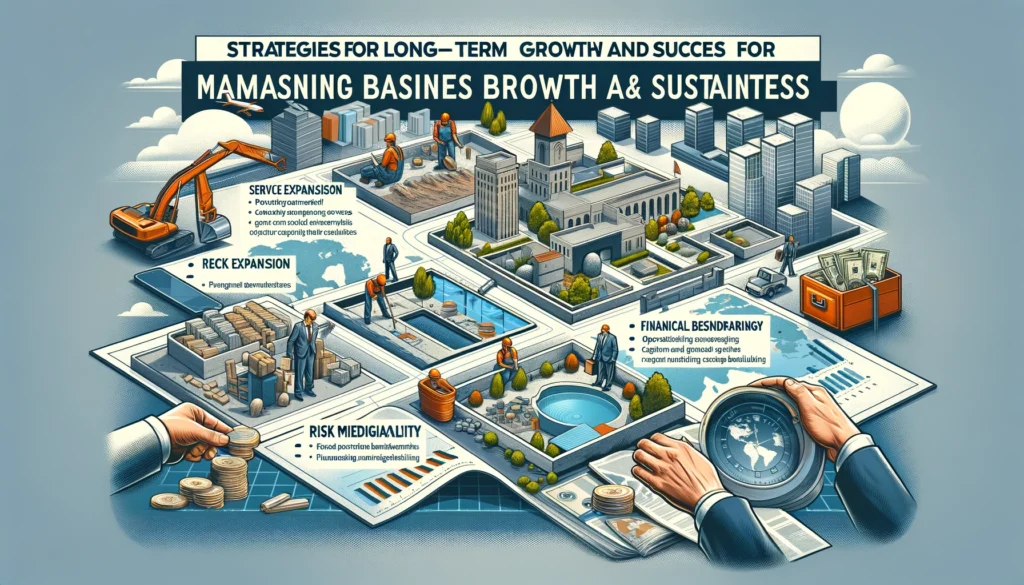In New York City’s heart, a century-old structure stands, its detailed stonework symbolizing masonry’s lasting artistry. Embarking on how to start a masonry business is not just about laying bricks, it’s about building foundations that last generations.
This field, where art and skill converge, epitomizes masonry – more than just bricklaying, it’s about crafting enduring foundations. The masonry industry, with its rich heritage, beckons those eager to blend practicality with creativity.
Currently, masonry services are increasingly sought-after, thanks to a growing preference for sustainable, visually appealing materials. This trend, coupled with aging infrastructure and new construction needs, positions starting a masonry company as a prime entrepreneurial venture. Remarkably, the masonry contractor industry rakes in over $30 billion annually in the United States alone.
Masonry’s versatility, from historical restoration to modern design, offers diverse opportunities. Whether it’s stone restoration or tuckpointing, the scope is broad. For aspiring entrepreneurs, strategic business planning and market research are essential.
This guide is crafted to steer you through the masonry business landscape, covering everything from legal requirements to business management and marketing strategies. Let’s begin this journey, laying your enterprise’s foundation stone.
Essential Tips and Steps to Start a Masonry Business

Develop a Masonry Business Plan
Before diving into starting a masonry company, the first critical step is crafting a comprehensive business plan. This in-depth document will serve as an indispensable guide as you undertake your new entrepreneurial masonry venture.
Research and Analyze the Masonry Business Market
- Conduct thorough market research to identify target demographics and growth opportunities.
- Examine your local area to determine competition levels, ideal services to offer based on demand, and average project pricing.
- For instance, residential tuckpointing repairs may be highly sought after in older neighborhoods while new housing developments call for extensive bricklaying masonry expertise.
- Define your business identity and set realistic first-year financial goals.
Define your Target Customers and Services
- Outline the specific customer profiles you aim to serve based on research findings.
- Categorize them by project type (e.g. homeowners needing stone patio upgrades vs. a hotel requiring commercial masonry wall installations).
- Determine the precise masonry offerings you will provide, such as stone restoration work, custom stone cutting, chimney repairs, block laying, etc. Create tiered pricing structures for diverse jobs.
Make Financial Projections and Set Goals
- Building in projected costs like masonry tools and equipment, licensing, marketing, etc, and masonry insurance policies in your calculations. Anticipate profit margins on planned jobs during the first year.
- Setting clear financial goals and understanding your break-even point are essential for long-term success.
- Establish targets for minimum revenue, numbers of customers/projects, and key milestones aligned to your masonry business vision.
- Using this fiscal framework, determine essentials like startup funding requirements, loan amounts, and expected timeline to break even/achieve sustainability. Revisit and revise details as needed.
Obtain Necessary Licenses and Permits
To legally establish masonry operations, certain paperwork must be completed, including:
Business License, Contractor License, etc.
- Research specific small business, occupational, and contractor licensing prerequisites in your state.
- Register your masonry company as a certified LLC or corporation.
- Acquire a federal EIN number for tax purposes.
- Meet criteria like being bonded/insured, passing exams, and demonstrating sound financial records.
Tax-Related Registrations
- Complete paperwork for state/federal tax ID numbers tied to payroll, sales tax collection on masonry services rendered, and itemized deductions.
- Set up payroll infrastructure to properly calculate withholdings, Social Security, Medicare, etc.
- Leverage an accountant to select optimal quarterly estimated payment structures.
- Stay current on income, self-employment, and business property tax obligations.
Invest in Masonry Tools and Equipment
To perform masonry work properly, specialized gear for mixing, shaping, cutting, and placing brick/stone is a must. Plan for these vital investments:
Essential Equipment like Trowels, Levels, etc.
For masonry contractors, having a comprehensive set of tools is crucial. Key items include:
- Trowels: For spreading mortar.
- Levels: To ensure evenness.
- Mason’s chisels: For shaping bricks and stones.
- Mixers: For preparing mortar and concrete.
- Scaffolding: For working on high areas.
- Safety gear: Helmets, gloves, and goggles.
Investing in high-quality masonry equipment ensures durability and precision in your projects.
Consider Leasing Options to Conserve Capital
When starting a masonry company, managing finances wisely is key. Leasing equipment can be a smart move.
- It conserves capital, offers flexibility, and ensures access to the latest tools.
- Evaluate leasing options for expensive items like mixers or scaffolding.
- This approach can help maintain cash flow for other urgent investments.
Once established, determine volume thresholds where purchased equipment pays for itself through frequent daily use. Let project size and scope coupled with budgetary realities guide decisions.
Establish Your Masonry Business Identity
Now it’s time to create lasting brand recognition for your new venture with these steps:
Create a Company Name and Logo
- Brainstorm and select your masonry business name carefully – this makes a first impression on potential customers.
- Consider elements that connote strength, durability, artistry, and trustworthiness.
- Design an iconic, professionally rendered logo befitting your brand identity.
- Ensure name/logo alignment with your website domain as well to reinforce it visually online/offline.
Your company name and logo are the face of your business. They should be:
- Memorable: Easy to recall.
- Relevant: Reflective of masonry services.
- Unique: Stand out in the masonry business market.
Design Marketing Materials like Business Cards
- Business cards, estimates sheets, invoices, site signage, and even your work truck should feature your logo alongside essential company information. These serve as moving brand advertisements.
- Craft an engaging, benefit-focused tagline. Provide contact details like phone, email, and website/social channels.
- With a polished brand image conveyed consistently across platforms, your credibility and memorability rise substantially.
Marketing materials are essential tools for masonry service marketing. Design business cards, brochures, and flyers that are:
- Informative: Clearly state your services and contact information.
- Visually appealing: Use your logo and brand colors.
- Professional: Reflect on the quality of your work.
Market Your Masonry Services Strategically
Implementing an assertive marketing strategy for your masonry company is vital to securing a consistent customer pipeline. Use these tips:
Website, Online Directories, Social Media
- An intuitive website with a portfolio of past stone and brick projects establishes instant credibility. Ensure it conveys your unique brand identity and processes contact requests smoothly.
- Creating profiles on HomeAdvisor, Angie’s List and other online contractor networks exposes you to countless homeowners seeking masonry contractors for upcoming jobs.
- Maintain active social media pages highlighting content like new equipment additions and client testimonials that further humanize your masonry business.
- Consider cost-efficient tactics like targeted Facebook ads. Weekly blog posts showcasing your specialized masonry expertise and commenting on community forums relevant to your services.
Traditional Advertising and Networking
- While online platforms open new doors, tried and true local advertising options still possess tremendous pull. Sponsor community event banners and programs.
- Run monthly promotions through newspaper/magazine ads in your service region. Have a memorable thirty-second radio commercial that airs during high-listenership home improvement programs.
- Attend in-person networking meetups and request introductions to general contractors that may source repeat tuck-pointing repair projects.
Strategies for Long-Term Growth and Success
Once your masonry business gains stability, executing strategies aimed at driving scalability, and profitability and securing market leadership will solidify the long-term prosperity of your enterprise.

- Exploring Service Expansion Opportunities: Assess current operations and identify prospects for adding complementary offerings like poured concrete services. Manufactured stone installation, custom pool building using specialty masonry techniques, etc.
- Entering New Geographical Markets: Research demographics and construction trends in surrounding regions. Determine the demand for masonry services to structure expansion plans and required marketing investments.
- Risk Mitigation Tactics: Build cash reserves to endure seasonal industry slowdowns. Cross-train staff in diverse masonry work strands and maintain adequate safety stock of key building supplies.
- Operational Scalability Planning: Analyze production bandwidth and create blueprints to grow capacity through larger facilities, added equipment, and hiring specialized masonry crews.
- Partnership Opportunities: Cultivate referral alliances with general contractors, architects, and property developers to be routed to new stonework or bricklaying projects.
- Marketing and Sales Initiatives: Continuously run targeted promotions across media platforms. Implement CRM to track/optimize conversions. Incentivize client referrals.
- Financial Benchmarking: Regularly compare financial metrics like revenue per employee, project margins, and receivables days against industry averages. Identify areas for optimizing spend and profitability.
- Advanced Business Development: Continuously seek ways to innovate and improve. This could involve advanced masonry business planning, exploring new masonry business growth strategies, or adopting new technologies.
Bottom Line
As we wrap up this guide, let’s cement the key takeaways for starting a masonry company. We have journeyed through the essentials of masonry business planning, from market research to marketing masonry services.
Remember, launching a profitable masonry company is more than just understanding stone and brick projects, it’s about building a solid business foundation. Continuous learning and professional development are crucial in the ever-evolving masonry industry.

Stay continually educated on the latest advancements in materials and methods through industry events and masonry-focused trade publications. Most importantly, ensure impeccable customer service through on-time, on-budget, highest-quality workmanship – this reputation will organically open up new local masonry opportunities.
We wish you the very best as you move forward in joining the ranks of the masonry trade and bringing your unique vision to life one perfectly laid brick, block, and stone at a time. Go exercise your craft and begin cementing your legacy now. The opportunities waiting in this vibrant masonry business market are endless!

